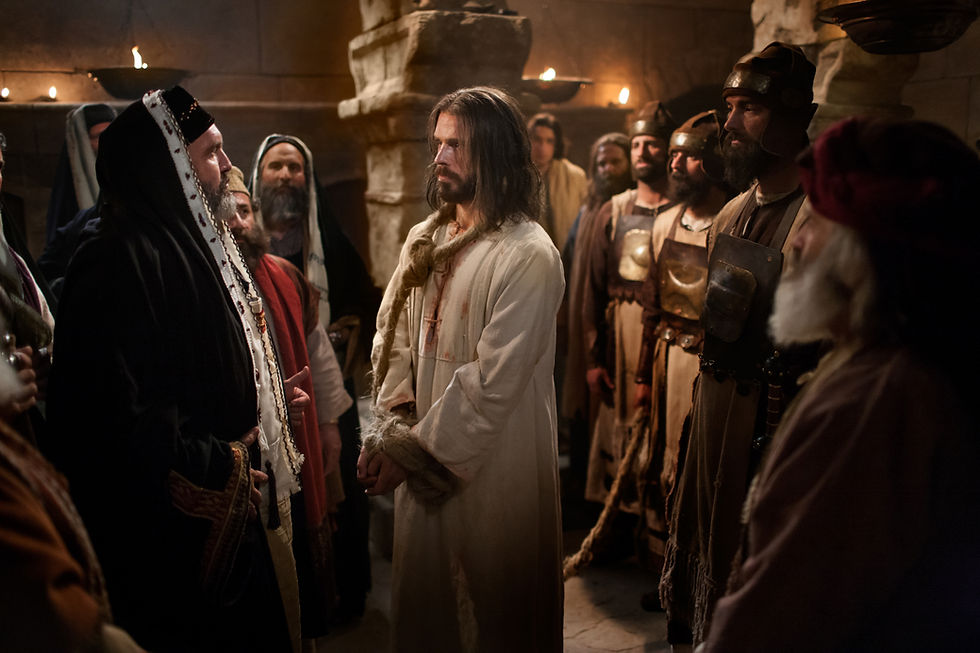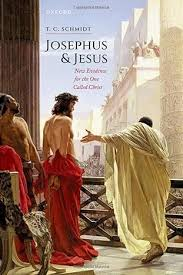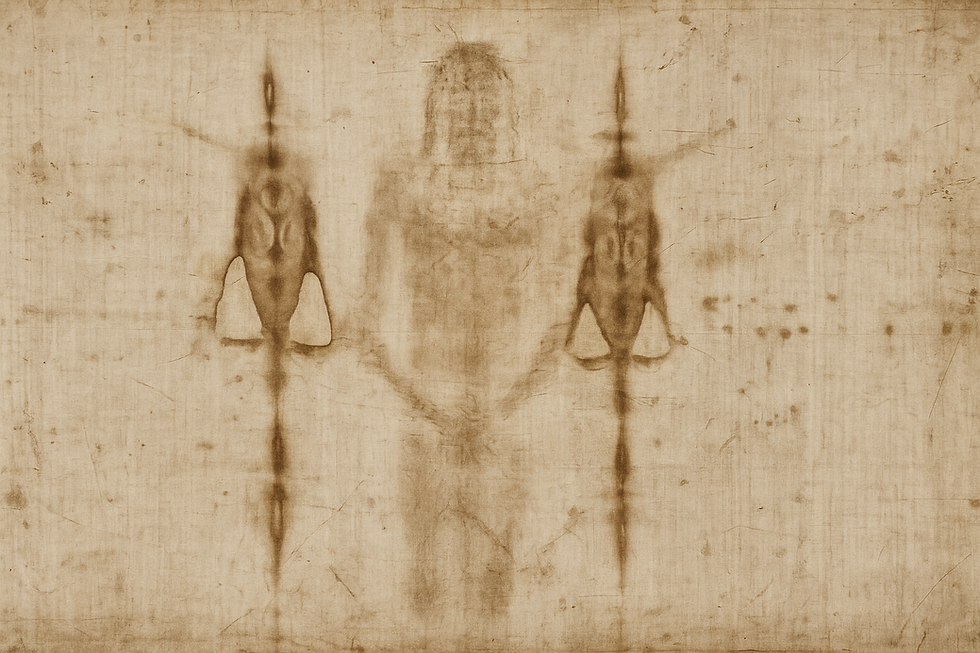"No credible evidence for a supernatural Jesus?"... Not so fast...
- Jason Goldberg
- Jun 12, 2025
- 5 min read
Updated: Jun 13, 2025

“If Jesus was real, why don’t we see more written about Him outside the Bible?
Fair enough. If Jesus really walked the dusty roads of Galilee, healed the sick, stirred crowds, was crucified under Roman authority, and sparked a movement that transformed the world… why aren't there historical records of His miracles, outside the Bible and Christian writings?
That’s why what I’m about to share is so significant.
A groundbreaking book by scholar T. C. Schmidt (Yale PhD) makes a really strong case there is, in the writings of one of the greatest historians of the first century: Flavius Josephus. Scholars have ignored the critical paragraph as a fraud. Not so fast, says scholar Schmidt...

Let’s unpack what this advanced research reveals—and why it matters for sincere truth-seekers, whether you're a committed Christian, a curious skeptic, or somewhere in between.
📜 Who Was Josephus—and Why Does He Matter?
Flavius Josephus was a first-century Jewish general who defected to the Romans and became a historian. He wasn’t a Christian. He never converted. But he left behind some of the most important historical accounts of the Jewish world in the time of Jesus.
Among his writings is a text called Antiquities of the Jews, written around 93–94 CE. In it lies a short, much-debated passage called the Testimonium Flavianum—a reference to Jesus, the one called Christ.
This passage is tantalizing. It mentions:
Jesus as a wise man
His reputation for miraculous works
His crucifixion under Pontius Pilate
And the claim that He rose again
Yes, it reads like a mini-Gospel summary. And for over a century, the scholarly consensus has been: “That can’t be real.”
The mainstream view has long assumed the passage was forged or edited by later Christians to insert a favorable view of Jesus into a Jewish historian’s work. Why?
It “sounds too Christian.”
No early Christians quoted it before Eusebius in the 4th century.
And it was assumed that Josephus, being Jewish, wouldn’t have said anything remotely positive about Jesus.
New evidence now shows these ssumptions were wrong.
🧠 What Schmidt Found—And Why It Matters
T. C. Schmidt is a scholar of early Christianity and ancient Jewish texts. His new book, Josephus and Jesus: New Evidence for the One Called Christ, is being hailed as a scholarly game-changer.
Here’s what leading scholars are saying:
Tobias Hägerland (University of Gothenburg): “An extraordinary scholarly achievement… compelling.”
Annette Yoshiko Reed (Harvard): “An astonishingly new intervention… scholars… will need to grapple with.”
Harold Attridge (Yale): “Thorough and sophisticated… Josephus can no longer be ignored.”
So what is Schmidt actually saying? Let’s break it down.
1. The Tone No One Wanted
If early Christians did insert this passage into Josephus’s work, wouldn’t they quote it constantly? Wouldn’t they point to it as a slam-dunk argument for Jesus?
They didn’t.
The first Christian writer to reference it—Eusebius- comes over 2 centuries later and mentions this paragraph quietly, even cautiously. Later Christians seem almost puzzled by it. It doesn’t read like a triumphant declaration. In fact, it sounds slightly skeptical, possibly even dismissive.
Schmidt argues that’s precisely the point. It retains a non-Christian tone. If Christians forged it, they did a terrible job selling Jesus. But if Josephus wrote it, we’d expect exactly this: a detached, outsider view of a man who clearly made waves, stirred controversy, and left a mark—even among those who didn’t believe in Him.
2. It Sounds Like Josephus—Because It Is
Schmidt applies advanced stylometric and philological tools to the text — essentially literary forensics now made possible by powerful computer algorithms. Said Given enough raw material, you can essentially pick up an author's literary fingerprint by evaluating typical sentence structure, vocabulary, and phrasing. You can then evaluate a text to see if the fingerprint is there. That's what powerful algorithms now enable us to do at a level and speed never before possible.
In less technical terms, forged texts usually feel different (like a person trying to mimic someone else’s voice and missing) because they are different: the use different sentence structure, words, phrases, styles.
Schmidt applies this tool to compare the Testimonium with Josephus’s other verified writings.
The result? A strong match.
Contrary to the claims of earlier scholars, The Testimonium doesn’t stick out like a pious edit. It blends in perfectly with Josephus's verified writings. The fingerprint matches. If it walks like Josephus, and talks like Josephus...
3. Josephus Knew the Right People
Here’s where it gets really compelling.
Josephus lived in Jerusalem not long after Jesus. He had one of the most impressive rolodexes of the early Jewish world. He had access to both Roman and Jewish elites (he met the Roman Emperor, and knew several Jewish high priests, having descended from a High priest himself). He knew leaders who were directly involved in the trials of Jesus and His followers. In fact, some of the officials he names elsewhere in his writings overlap with those involved in the early Christian story.
Schmidt argues that Josephus’s account of Jesus likely came from firsthand or near-firsthand sources—people who had been there, who had seen what happened.
In other words - as you'd expect of a historian of Josephus's reputation - the Testimonium isn’t myth, it's reporting.
🧪 But What Do Scholars Think?
This isn’t just one academic's lonely opinion.
Top-tier scholars from Yale, Harvard, and Europe are taking this seriously. They’re calling it a turning point in how we view Josephus’s text and its place in the study of the historical Jesus.
Schmidt’s method is rigorous. He blends historical methodology, philology, and reception history—asking not just what was written, but how it was received and understood over time. And his conclusion is clear:
The Testimonium was not a later forgery. It’s likely the real voice of Josephus—an ancient Jewish historian referencing the impact and reputation of Jesus of Nazareth.
💡 Why This Changes the Conversation
If Schmidt is right (and I believe he is), here’s what we now have:
✅ A non-Christian, early historical reference to Jesus
✅ Written within 60 years of His death
✅ Affirming His miracles, execution, and resurrection claims
✅ From a Jewish source with no interest in Christian apologetics
This doesn’t “prove” Jesus is the Son of God. But it drastically narrows the gap between faith and history.
Skeptics often say, “You only believe because the Bible says so.” But what if history also speaks—and points in the same direction?
🙏 To the Honest Skeptic—and the Questioning Believer
If you're skeptical, I get it. Blind belief is not the goal here. But neither is blind dismissal.
"The truth will set you free." He was right; it has. Millions of people have experienced it. You can too. Sure, it comes at a cost. But not as great as the cost of missing the truth.
So here’s my invitation: reread what Josephus wrote. If even a Jewish historian wrote of Jesus' reputation for miracles and alleged resurrection from the dead, could the rest not alss be true?
Final Thoughts
For over a century, this ancient paragraph from Josephus was dismissed, sidelined, or explained away. But now, with new tools and fresh eyes, we’re seeing what may have been there all along:
A famed Jewish historian, writing with no Christian agenda, acknowledged a man named Jesus… known for wonder-working, executed under Pilate, and whose followers claimed He rose again.


Comments